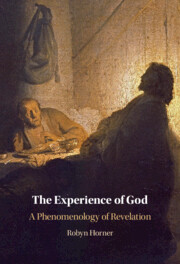Book contents
- The Experience of God
- The Experience of God
- Copyright page
- Contents
- Acknowledgements
- Part I The Problem in Context
- Chapter 1 Introduction to the Book
- Chapter 2 Living in a Secular Age
- Part II Revelation in Contemporary Philosophy and Theology
- Part III The Event of Revelation
- Part IV The Event in Person
- Bibliography
- Index
Chapter 1 - Introduction to the Book
from Part I - The Problem in Context
Published online by Cambridge University Press: 13 October 2022
- The Experience of God
- The Experience of God
- Copyright page
- Contents
- Acknowledgements
- Part I The Problem in Context
- Chapter 1 Introduction to the Book
- Chapter 2 Living in a Secular Age
- Part II Revelation in Contemporary Philosophy and Theology
- Part III The Event of Revelation
- Part IV The Event in Person
- Bibliography
- Index
Summary
Chapter 1 introduces the major themes of the book. I argue that the idea of divine revelation does not make much sense in the contemporary world, because it is primarily thought about in terms of beliefs rather than experience. Philosophically, experience is (i) what happens at the point of opening in the world, which is a given instance of life, as well as (ii) conscious reflection on that experience as it is lived. For both senses of the word, using a hermeneutic-phenomenological methodology, it is possible to speak of prepredicative experience – that is, what takes place (or 'events') prior to thematisation in language. I argue that it is the prepredicative sense of experience that is engaged in revelation. This is because God cannot be made an 'object' of experience. Now, since in modern life, the word ‘belief’ risks coming to mean simply what is untrue or subjective, it is no longer very helpful in communicating something about God. In contrast, 'the event' can be used to consider the possibility of encountering a God who reveals Godself in person. To conclude the introduction, I set out how my argument about experience and the 'event' is carried through each chapter.
- Type
- Chapter
- Information
- The Experience of GodA Phenomenology of Revelation, pp. 3 - 19Publisher: Cambridge University PressPrint publication year: 2022

